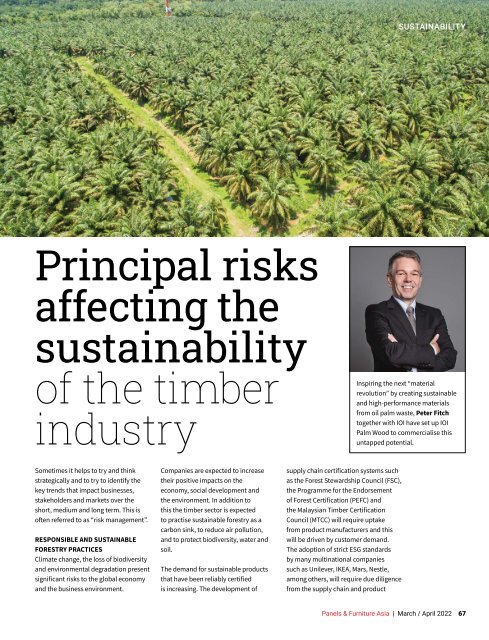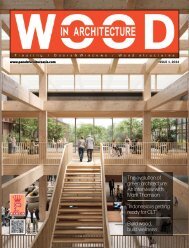Panels & Furniture March/April 2022
Panels & Furniture Asia (PFA) is a leading regional trade magazine dedicated to the woodbased panel, furniture and flooring processing industry. Published bi-monthly since 2000, PFA delivers authentic journalism to cover the latest news, technology, machinery, projects, products and trade events throughout the sector. With a hardcopy and digital readership comprising manufacturers, designers and specifiers, among others, PFA is the platform of choice for connecting brands across the global woodworking landscape.
Panels & Furniture Asia (PFA) is a leading regional trade magazine dedicated to the woodbased panel, furniture and flooring processing industry. Published bi-monthly since 2000, PFA delivers authentic journalism to cover the latest news, technology, machinery, projects, products and trade events throughout the sector. With a hardcopy and digital readership comprising manufacturers, designers and specifiers, among others, PFA is the platform of choice for connecting brands across the global woodworking landscape.
Create successful ePaper yourself
Turn your PDF publications into a flip-book with our unique Google optimized e-Paper software.
SUSTAINABILITY<br />
Principal risks<br />
affecting the<br />
sustainability<br />
of the timber<br />
industry<br />
Inspiring the next “material<br />
revolution” by creating sustainable<br />
and high-performance materials<br />
from oil palm waste, Peter Fitch<br />
together with IOI have set up IOI<br />
Palm Wood to commercialise this<br />
untapped potential.<br />
Sometimes it helps to try and think<br />
strategically and to try to identify the<br />
key trends that impact businesses,<br />
stakeholders and markets over the<br />
short, medium and long term. This is<br />
often referred to as “risk management”.<br />
RESPONSIBLE AND SUSTAINABLE<br />
FORESTRY PRACTICES<br />
Climate change, the loss of biodiversity<br />
and environmental degradation present<br />
significant risks to the global economy<br />
and the business environment.<br />
Companies are expected to increase<br />
their positive impacts on the<br />
economy, social development and<br />
the environment. In addition to<br />
this the timber sector is expected<br />
to practise sustainable forestry as a<br />
carbon sink, to reduce air pollution,<br />
and to protect biodiversity, water and<br />
soil.<br />
The demand for sustainable products<br />
that have been reliably certified<br />
is increasing. The development of<br />
supply chain certification systems such<br />
as the Forest Stewardship Council (FSC),<br />
the Programme for the Endorsement<br />
of Forest Certification (PEFC) and<br />
the Malaysian Timber Certification<br />
Council (MTCC) will require uptake<br />
from product manufacturers and this<br />
will be driven by customer demand.<br />
The adoption of strict ESG standards<br />
by many multinational companies<br />
such as Unilever, IKEA, Mars, Nestle,<br />
among others, will require due diligence<br />
from the supply chain and product<br />
<strong>Panels</strong> & <strong>Furniture</strong> Asia | <strong>March</strong> / <strong>April</strong> <strong>2022</strong> 67


















